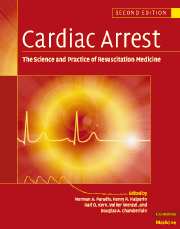Book contents
- Frontmatter
- Contents
- List of contributors
- Foreword
- Preface
- Part I Introduction
- Part II Basic science
- Part III The pathophysiology of global ischemia and reperfusion
- 12 The etiology of sudden death
- 13 Global brain ischemia and reperfusion
- 14 Reperfusion injury in cardiac arrest and cardiopulmonary resuscitation
- 15 Visceral organ ischemia and reperfusion in cardiac arrest
- 16 Mechanisms of forward flow during external chest compression
- 17 Hemodynamics of cardiac arrest
- 18 Coronary perfusion pressure during cardiopulmonary resuscitation
- 19 Methods to improve cerebral blood flow and neurological outcome after cardiac arrest
- 20 Pharmacology of cardiac arrest and reperfusion
- 21 Analysis and predictive value of the ventricular fibrillation waveform
- 22 Etiology, electrophysiology, and myocardial mechanics of pulseless electrical activity
- Part IV Therapy of sudden death
- Part V Postresuscitation disease and its care
- Part VI Special resuscitation circumstances
- Part VII Special issues in resuscitation
- Index
13 - Global brain ischemia and reperfusion
from Part III - The pathophysiology of global ischemia and reperfusion
Published online by Cambridge University Press: 06 January 2010
- Frontmatter
- Contents
- List of contributors
- Foreword
- Preface
- Part I Introduction
- Part II Basic science
- Part III The pathophysiology of global ischemia and reperfusion
- 12 The etiology of sudden death
- 13 Global brain ischemia and reperfusion
- 14 Reperfusion injury in cardiac arrest and cardiopulmonary resuscitation
- 15 Visceral organ ischemia and reperfusion in cardiac arrest
- 16 Mechanisms of forward flow during external chest compression
- 17 Hemodynamics of cardiac arrest
- 18 Coronary perfusion pressure during cardiopulmonary resuscitation
- 19 Methods to improve cerebral blood flow and neurological outcome after cardiac arrest
- 20 Pharmacology of cardiac arrest and reperfusion
- 21 Analysis and predictive value of the ventricular fibrillation waveform
- 22 Etiology, electrophysiology, and myocardial mechanics of pulseless electrical activity
- Part IV Therapy of sudden death
- Part V Postresuscitation disease and its care
- Part VI Special resuscitation circumstances
- Part VII Special issues in resuscitation
- Index
Summary
Introduction
Sudden, unexpected death claims nearly 1000 lives each day in the United States and is the fifth leading cause of all deaths in the western world. Cardiac arrest occurs over 300 000 times per year both in the United States and Europe with the risk for persons 35 years and older estimated at 1 per 1000. In those patients resuscitated from cardiac arrest, nearly 60% die from a neurological cause. Despite every effort, only 3%–10% of all resuscitated patients are able to resume their former lifestyles.
To date, there are no clinically effective pharmacologic tools for amelioration of brain damage by ischemia and reperfusion. Clinical trials conducted more than a decade ago utilizing postresuscitation treatment with barbiturates or calcium antagonists were disappointing. More recently, clinical treatment of stroke with a radical scavenger (trilazad), intercellular adhesion molecule-1 antagonist (Enlimomab), glutamate receptor antagonist (Aptiganel, gavestinel), glutamate release inhibitor (Lubeluzole), ganglioside administration (GM1), calcium channel blockade, or upregulation of the GABA receptor (Clomethiazole) were all found ineffective. This suggests that our understanding of the mechanisms involved in damage and repair in neurons remains incomplete and further therapeutic progress will require the delineation of the primary mechanisms involved in neuronal injury and repair.
Although the picture is still incomplete, a few things are clear.
The majority of damage occurs not during ischemia but during reperfusion. Nevertheless, the two processes work sequentially to increase neuronal damage (i.e., lipolysis during ischemia potentiates the radicalmediated peroxidation of polyunsaturated fatty acids (PUFAs) during reperfusion).
[…]
- Type
- Chapter
- Information
- Cardiac ArrestThe Science and Practice of Resuscitation Medicine, pp. 236 - 281Publisher: Cambridge University PressPrint publication year: 2007
- 2
- Cited by



